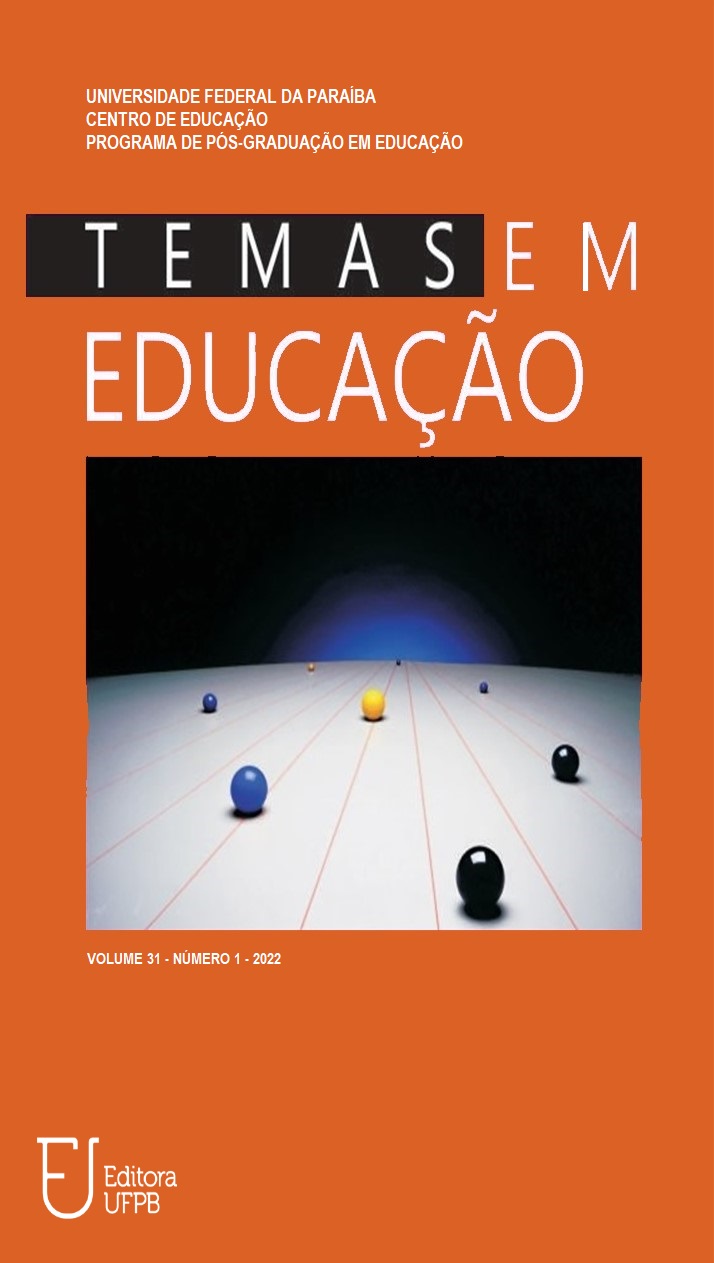UMA REVISÃO SOBRE A EDUCAÇÃO PRISIONAL NO BRASIL: O QUE (NÃO) HÁ SOBRE O ENSINO DE CIÊNCIAS
DOI:
https://doi.org/10.22478/ufpb.2359-7003.2022v31n1.62093Keywords:
Educação de adultos privados de liberdade, Educação em espaços de privação de liberdade, Ensino de CiênciasAbstract
This paper aimed to understand how current research presents the theme of prison education, specifically regarding the teaching of science. The data were obtained from the Portal of Periodicals and Catalogs of Theses and Dissertations of the Coordination for the Improvement of Higher Education Personnel (CAPES), in the period from 2011 to 2020, and in the editions of the National Meeting of Research in Science Education (ENPEC) and National Meeting of Chemistry Teaching (ENEQ) from 2012 to 2020. For data analysis, content analysis was used. The literature consulted points out that education in prisons shares space with its subordination to discipline. On the other hand, the functionality of school in prison is undeniable, since it not only allows prisoners to acquire formal knowledge and have access to some level of schooling, but it also plays an important role in the life of the teacher who works in this context. This may provide the incarcerated subject with experiences of that reality and the effectiveness of the educational process in prisons, and may bring a significant experience for teacher training.
Downloads
References
APPLE, Michael Whitman. A educação pode mudar a sociedade. Tradução de Lílian Loman. Petrópolis, Rio de Janeiro: Vozes, 2017.
BARDIN, Laurence. Análise de Conteúdo. Lisboa: Edições 70, 2002.
BRASIL. Presidência da República. Casa Civil. Subchefia para Assuntos Jurídicos. Lei Nº 9.394, de Diretrizes e Bases da Educação Nacional, de 20 de dezembro de 1996. Brasília: Casa Civil, 1996 L9394 (planalto.gov.br). Acesso em 19.11.21.
______. Constituição (1988). Constituição da República Federativa do Brasil: Promulgada em 5 de outubro de 1988: atualizada até a Emenda Constitucional nº 99, de 14-12-2017.
CAMPOS, Aline; ROSA, Camila Simões. Rodas de conversas em prisões. Revista Temas em Educação. João Pessoa, Brasil, v. 29, n.2, p. 249-267, maio/jul., 2020.
CAVALCANTE, Elisângela Caldas Braga; DE ARAÚJO GASTAL, Maria Luiza. Ensino de Biologia na Educação Prisional e a exibição de documentário, filme de curta e longa metragem. In: VIII Encontro Nacional de Pesquisa em Educação em Ciências (VIII ENPEC), 2011, Campinas. Anais. Campinas: UNICAMP. 2011.
LEITE, Rosana Franzen. A Perspectiva da Análise de Conteúdo na Pesquisa Qualitativa: Algumas Considerações. Revista Pesquisa Qualitativa, v.5, n.9, p. 539-551, dez 2017.
MELLO, Fábio Mansano de; ALVES, Ana Elizabeth Santos. A educação nas prisões como técnica de controle do carcerário: algumas considerações. In: SANTOS, Arlete Ramos; OLIVEIRA, Júlia Maria da Silva, COELHO, Lívia Andrade (Orgs). Educação e sua diversidade [online]. Ilhéus, BA: EDITUS, 2017, pp. 145-156.
ONOFRE, Elenice Maria Cammarosano. Educação Escolar na Prisão: O Olhar de Alunos e Professores. Jundiaí, Paco Editorial: 2014.
SOUZA, Carolina Maciel; ONOFRE, Elenice Maria Cammarosano. Desafios de uma professora de educação física na medida socioeducativa de internação. Reflexão e Ação, v. 27, n. 2, p. 166-181, mai./ago. 2019.
UMPIERREZ, Anália. Traços de uma proposta educacional e artística nas prisões. Revista Temas em Educação, v.29, n.2, p. 228-248, fev/jul., 2020.
Downloads
Published
How to Cite
Issue
Section
License
Copyright (c) 2022 Revista Temas em Educação

This work is licensed under a Creative Commons Attribution 4.0 International License.
Authors who publish in this journal agree to the following terms:
. Authors retain the copyright and grant the journal the right to first publication, with the work simultaneously licensed under the Licença Creative Commons Attribution that allows the sharing of the work with acknowledgment of authorship and initial publication in this magazine. . Authors are authorized to assume additional contracts separately, for non-exclusive distribution of the version of the work published in this journal (eg, publishing in institutional repository or as a book chapter), with acknowledgment of authorship and initial publication in this journal.
. Authors are permitted and encouraged to publish and distribute their work online (eg in institutional repositories or on their personal page) at any point before or during the editorial process, as this can generate productive changes, as well as increase impact and citation of the published work (See O Efeito do Acesso Livre).



















